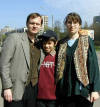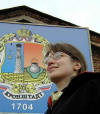Report on the trip to St. Petersburg and meetings with V.
Volkov, April - May 2001
Part 2
| On the next day, 30 April, Lena went to work, while Volkov with his wife and their son
Nikita came over to the house where I was staying for some more discussions. We went out
to buy some food, and I took the following picture of them three (click on
the images to enlarge). |
 |
The discussion lasted
from around 2 in the afternoon until about 11.30 p.m. The topics included: 1)
what is the
revolutionary force in the modern society? Volkov, giving a traditional marxist answer,
said it was a proletariat. By that he means both those who work mostly with their hands,
and those who work mostly with their heads. My position should be obvious from what was
said on the first day of discussions. I believe in people who are gaining
modern knowledge
to organize all aspects of production necessary the global economy. I believe it is incorrect to call these people
"proletariat", just like it would be incorrect to call by the name
"slaves" serfs who worked for feudal masters. For example, none of modern
information specialists considers him/herself "a proletarian". They all believe
that they have a great control over modern productions, although Volkov believes this is
an illusion. I believe that these, and similar kind of people, are getting ready to get
rid of all middlemen in all aspects of production. This includes organization of
production, administration, etc. Teleworking cuts down need in these "organization
specialists".
Positions of Volkov in general appear to me quite traditional. Reciting a
marxist answer these days is no more revolutionary than reciting Aristotle in the days of
Renaissance.
2) Next, we considered a civil war. I argued that this is what's coming,
considering the scenario we see in Yugoslavia and in Chechnya. Volkov took the position
that these are not examples of civil wars. Rather, he believes these are wars between
elites. As to the civil war, he doesn't deny that it will be an aspect of a modern
revolution, but he argues (somewhat like Sergei Bietz, in Moscow) that it will be
"almost virtual". On the other hand, I pointed out that every revolution, and
hence civil war, starts like an argument within the ruling elites. Thus, in the days of
the French revolution (period of General Estates), the king and some nobility sided with
the Third Estate in order to implement financial reforms against the tops of aristocracy
and the clergy. Similarly in Chechnya: here we see contradictions between regional and
central bureaucracy. The cause of the fighting is a division of property rights over the
oil of the region. Hence, both sides, but especially the Chechen leaders, attempt to
enlist the civil population onto its side, in order to win the war.
Thus, one prominent contradiction of the modern era is that between
regional and central bureaucracies over the ownership rights. The other prominent
contradiction is that of between bureaucracy and those who actually function in the
capitalist fashion, i.e. the "New Russians". However, here the bureaucracy
appears to be much stronger than its opponent, as we see in the example of Gusinsky. The
U.S. is of course covering him up.
Thus, I believe that both Yugoslavia and Chechnya are examples of a civil
war. The most prominent contradictions of the modern era in our region are destroying our
respective countries. These are centrifugal forces which are pulling the state apart. They
are helped on by the high level of corruption, both within the civil and military.
The role of the U.S. and NATO in this conflict we have most sharply so far
seen in the bombing of Yugoslavia in the spring of 1999. The cowardly role of Moscow
bureaucracy we have seen in the intense negotiations which the bureaucracy was conducting
with the U.S. at that time.
All in all, we see that U.S. basically has had its way,
despite oppositions to bombing coming from within NATO (Greece and Italy). Already, we see
a similar scenario being prepared for Chechnya. C. Powell is concerned for "human
rights" in the region. Americans are only waiting for the right political moment to
put an ultimatum to Russia. What will be the cowardly response of Russian bureaucracy? Are
we to expect an appearance of an anti-NATO, anti-bureaucratic party, like we see in
Yugoslavia? The picture on the right suggests that.
(Greece and Italy). Already, we see
a similar scenario being prepared for Chechnya. C. Powell is concerned for "human
rights" in the region. Americans are only waiting for the right political moment to
put an ultimatum to Russia. What will be the cowardly response of Russian bureaucracy? Are
we to expect an appearance of an anti-NATO, anti-bureaucratic party, like we see in
Yugoslavia? The picture on the right suggests that.
3) The third topic of our conversations was the character of the post-WWII
period. Again, Volkov thinks, along with marxists, that the main contradiction of the
epoch was that between the working class and the capitalists. In my opinion, this is very
traditional and very abstract. In reality, we have seen the contradictions between
non-capitalist and capitalist countries as dominating the events of the period. These
contradictions are called "the Cold War", and today, more than ever, we see that
it is not over. The same policy advocated by Kennan in 1947 (opposition to the Soviet
Russia on each and every geopolitical point) we see today.
Volkov accuses me of judging by "external signs", while he
claims to see deeper. To support his view, he brings up the events like those in Paris in
1968. To this I answer that those events were dominated by students, and only supported by
workers. Similar scheme we saw in China in 1989. In China the most prominent slogan was that
of democracy, i.e. right to speak out one's mind without being put in jail. But political
content of these democratic manifestations was anti-socialist, anti-marxist.
I believe that WWIII is already being fought, in a "peaceful"
form, under the guise of
a continuing Cold war. Currently, we see it under the guise of a false U.S. concern for "human rights" in Russia and in China. Within this major contradiction of our epoch, we find
secondary contradictions between defenders of status quo within each state, and those
opposed to it, either from democratic or socialist positions.
If we're to be concerned with a strategy to winning a war against both an
internal and an external enemy, we must say that both must be fought simultaneously. Both
international capital and domestic bureacracy must be fought.
| May 1st is a holiday - An International Workers' Day. We, as marxists, used to spend
this day trying to join demonstrations, distributing literature, trying to recruit members
into our organizations. However, both I and Yulia got disappointed with such an activity.
We only saw old people at the demonstrations (in the former USSR). They were hostile to
any fresh word. And so, on this May 1st, due to the initiative of Lena, we decided to go
together to Kronstadt, famous for its revolutionary sailors in 1917, and also for the
uprising against Bolsheviks in 1921. On the right you can see Yulia with the background of
the emblem of Kronstadt (click to enlarge). |
 |
| Kronstadt is known today as the base of war ships of the
Russian Baltic fleet. Some of them you can see on the picture on the right. They seem to be in
disrepair, in need of painting, on the outside. On the inside, I am sure that they lag in
electronics (in comparison to modern ships of NATO). As for the food on board, I spoke to
one sailor about it, on the central square of the island-city. He said that on his ship
the situation was OK, as it was a ship meant to sail to foreign ports for friendship
visits. But on other ships, the situation with food was worse. |
 |
Also, Volkov took a picture of me, Yulia, and Nikita, with the ships
serving as a background. This is a picture which Yulia must like:

| From the waterfront, we walked to the central square, called "Yakorny
square". There is a museum dedicated to the history of the fleet. The shape of the
museum is like that of a church, and you can see it in the background, beyond the bridge
(first picture on the right).
Lena generously paid for
all our entry tickets. Also on the main square, you can see the pyramid, with
revolutionary insignia written on it (second picture). |

 |
| On the same square, I have met a
group of bikers from Petrozavodsk (which is in Karelia). Since I myself an avid bike fan,
I came to chat with them. We exchanged our addresses, and I took a few photos of them.
Their site on Internet is at: htpp://home.onego.ru/~pashkov/index.html |
 |
Then five of us - Lena and I, Vladimir, Yulia, and their son Nikita - went walking
around the city. It was one of the first days of spring in this northern region, and so to
convey the feeling I took the following picture (with my newly acquired Olympus C-990Zoom
Digital Camera, many thanks to my mother and relatives).

On that day, we returned home rather tired, at around 8 in the evening. But still, I
felt freshness and spring. And so to capture the feeling, I took the following picture
near the house where I was staying with Lena:

Next: part 3








